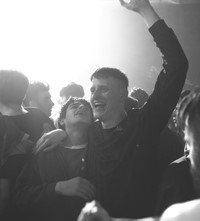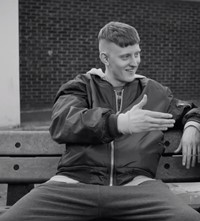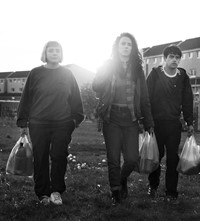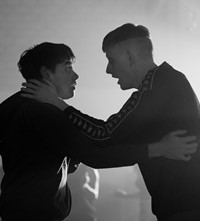“I hope that Beats opens people’s minds to the possibility of creativity, fun and disobedience,” says writer-director Brian Welsh as his new film arrives in UK cinemas
- TextDaisy Woodward
“I think it’s one of the themes of almost everyone’s youth: that the thing that’s just preceded you – rock and roll, punk, whatever – seems that much more exciting than what’s actually happening,” says Scottish writer and director Brian Welsh with a laugh. He’s discussing his searing sophomore film Beats, an ode to the early 90s rave scene, which Welsh, himself a devout technophile, missed by just a couple of years. The beautifully shot, black-and-white film is set in the brutalist environs of West Lothian in 1994, just as the Criminal Justice and Public Order Bill is introduced by the Tories – then at the tailend of their leadership, as TV clips of a promise-laden Tony Blair remind us – in an attempt to quash the UK’s burgeoning rave culture. The new legislation banned any music gatherings of more than 20 people, “wholly or predominantly characterised by the emission of a succession of repetitive beats”. It prompted outrage and rebellion among electronic music fans, but was ultimately successful in bringing the hedonistic era of large-scale, unrestricted partying to a close.
Welsh had been looking to make a film about rave culture for some time, when a friend of his suggested he go to see playwright Kieran Hurley’s one-man play Beats, a moving tale of friendship between two techno-mad teenage boys, at the Bush Theatre in London in 2012. “I felt very viscerally connected to it,” Welsh recalls. “Not just in terms of the energy and the music but because it reflected my own experiences and I felt Kieran and I shared a similar sense of humour and came from similar backgrounds.” He approached Hurley in the bar afterwards and they immediately hit it off, soon determining to join forces to adapt the play into a film.
Just as in the play, Beats centres on 15-year-old pals Spanner (played in the film by Lorn Macdonald) and Johnno (Macdonald’s real-life friend from acting school, Cristian Ortega). Johnno is a shy, wide-eyed, middle-class kid, whose mother Allison and her new partner, a straight-laced local cop, have just announced a plan to move to a smarter neighbourhood. This is, in part, to distance Johnno from his wild, gangly, rule-rebuking friend, who lives in a nearby council estate with his foully abusive older brother. Propelled by a sense of time slipping away from them – both in terms of their friendship and the music scene that has granted their older cohorts so much fun and freedom – the lovable pair embark on a mission to attend their first proper party, an underground protest rave, with the help of Spanner’s cousin (Rachel Jackson) and her pals (Gemma McElhinney and Amy Manson).
The group’s journey is one of heady highs and grounding lows, set to a pulsating soundtrack and touching on the forlorn climate of the post-industrial Scotland from which, to quote Welsh, the country’s rave culture subconsciously sprung. Equally, it is punctuated by moments of laugh-out-loud comedy that betray some of Welsh’s key references, including Withnail and I, Superbad and Thelma and Louise. Meanwhile a thrilling subplot sees tension rise to an almost unbearable peak, only to dissolve in a burst of strobe-lit euphoria during a blissed out rave scene – the effect of which upon audiences is aptly comparable to that of being manipulated by a master DJ.
The film’s predominantly monochrome palette lends an intense intimacy to the story. “It’s that old, iconic quality that I think makes you look at the characters a lot more attentively,” Welsh – who only announced his plans to switch the rushes to monochrome on the second day of shooting for fear of losing funding – affirms. “You feel much closer to them and you’re not asking questions about the surrounding environment or the period detail.” And indeed, as much as being a story about a very specific musical genre at a very specific moment, the glue that binds Beats and makes it so timeless is the sense of youthful comradery at its heart, and the concept of music generally as a gateway for self-expression and cultural revolt. This is very much a message that Welsh hopes young viewers will take away from the film: “I think we live in times when stories like this are really important,” he says, “and I hope that it opens people’s minds to the possibility of creativity, fun and disobedience.”
Beats is in cinemas nationwide.















